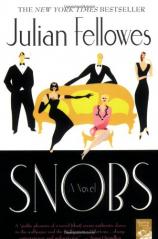Reading Group Guide
Discussion Questions
Snobs

1. What is your opinion of Edith? In what ways do you feel her choices are justified or otherwise? Did she know --- or should she have known --- what marriage to Charles would entail?
2. Edith might be said to have made a "bargain" in life. She has chosen to provide herself with a position of importance and power rather than to marry for love. Is this kind of bargain immoral in our day and age --- or is it her failure to stick to the deal that puts her at fault?
3. Both the narrator and Julian Fellowes have a certain soft spot for Lady Uckfield. How do you feel about Googie's approach to life, including the value she places on doing things "properly"?
4. The Uckfields and Charles accept that their largely unearned status carries with it certain public duties and responsibilities. How is hereditary obligation, in exchange for privilege, useful in a society? In what ways is it detrimental?
5. Contrast the actors' world to life at Broughton. What are the attractions and limitations of both?
6. Who are the biggest snobs in the book, and how does this affect your view of them?
7. The ending of Snobs could be called cynical. Edith is "happy enough," which is hardly a fairytale conclusion. Is she right to "settle" for a reasonable level of contentment without continuing to search for more or should she have set off again into the unknown? In other words, is it moral or immoral to be realistic? In fact, what sort of future do you envision for Edith and Charles? How about for the other couples?
8. The narrator describes the English as "addicted to exclusivity. Leave three Englishmen in a room and they will invent a rule that prevents a fourth joining them." How does this manifest itself in American society? Would you say that Americans are also "addicted" to exclusivity, or is this a peculiarly English phenomenon?
9. F. Scott Fitzgerald said, "The rich are different from you and me." In what ways do the wealthy characters in Snobs seem different from --- or similar to --- other people you've met?
10. What do you think of the narrator's observation that "one of the basic truths of life is that, as a general rule, the world takes you at your own estimation"?
11. Julian Fellowes says in his interview that he sees Snobs as being more about choice than about class. How do you rate the relative importance of social standing and their own actions in the main characters' lives?
12. How do the characters' perceptions of the different lives being lived around them differ from the reality? Is Charles's view of the stage world accurate? Is Mrs. Lavery's idea of the aristocratic life accurate? How much misunderstanding is caused by inaccurate preconceptions of what other people are going through?
Snobs
- Publication Date: January 24, 2006
- Genres: Fiction
- Paperback: 288 pages
- Publisher: St. Martin's Griffin
- ISBN-10: 0312336934
- ISBN-13: 9780312336936








